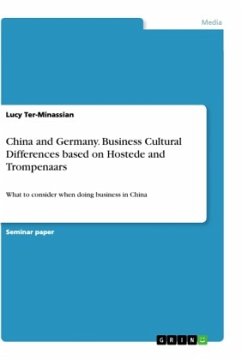
National Cultural dimensions according to Geert Hofstede and their meaning in Japanese and German Corporate Management
Versandkostenfrei!
Versandfertig in 1-2 Wochen
17,95 €
inkl. MwSt.

PAYBACK Punkte
0 °P sammeln!
Seminar paper from the year 2009 in the subject Communications - Intercultural Communication, grade: 1,7, University of applied sciences, Duisburg, course: Interkulturelle Kompetenzen, language: English, abstract: Cultural differences concerning religion, sex, generation, class, history and values lead to different ways of thinking, feeling and acting. These aspects have not only to be considered when trying to define countries and categorise people, but also when trying to understand organisations. The leadership of each corporation is based on these factors. E.g. when you are trying to defin...
Seminar paper from the year 2009 in the subject Communications - Intercultural Communication, grade: 1,7, University of applied sciences, Duisburg, course: Interkulturelle Kompetenzen, language: English, abstract: Cultural differences concerning religion, sex, generation, class, history and values lead to different ways of thinking, feeling and acting. These aspects have not only to be considered when trying to define countries and categorise people, but also when trying to understand organisations. The leadership of each corporation is based on these factors. E.g. when you are trying to define the meaning of success. Japanese companies like Toyota characterise success as quality of their products, satisfaction of their employees and customers. German corporations define profit as success. Organisational structures, corporate goals, personnel policy, suspension of staff, job description, employee suggestion system and salary history differs. Due to globalisation, expansion of themarket, mergers and takeovers, companies have to deal with the various numerous of cultures in order to survive in long-term and to remain competitive.












